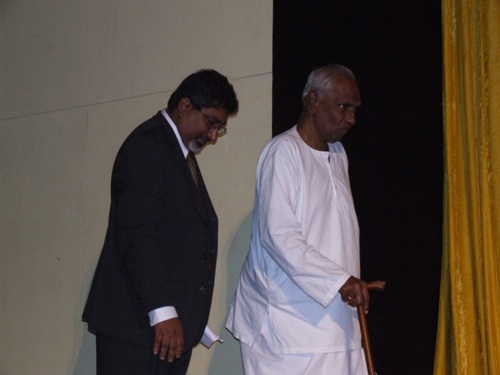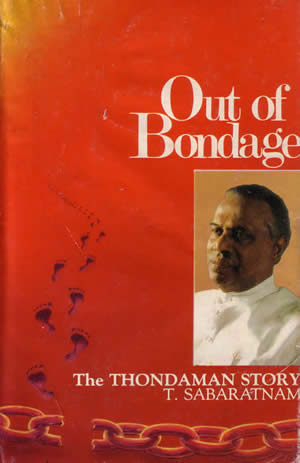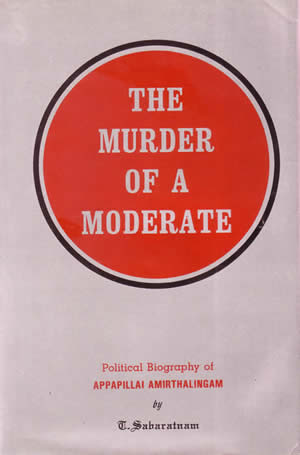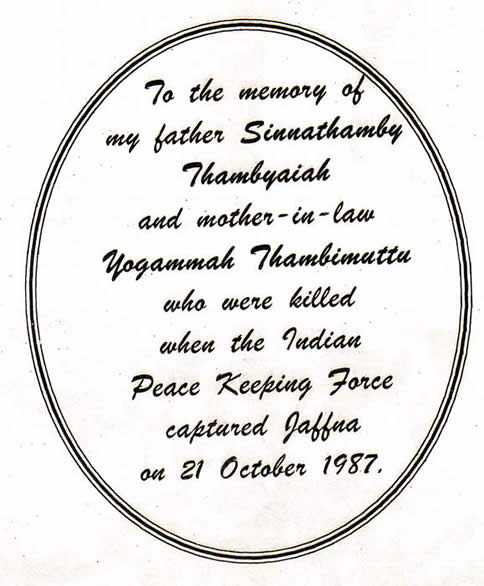Ilankai Tamil Sangam28th Year on the Web Association of Tamils of Sri Lanka in the USA |
|||||
 Home Home Archives Archives |
In Memoriam: T. Sabaratnam1932-2011by Sachi Sri Kantha, March 22, 2011
I have known Tamil journalist T. Sabaratnam for over 40 years. His wife Padmavathy was my physics teacher at the Colombo Hindu College, Ratmalana during 1967-69. I was also the flute tutor to Saseenthiran, one of Mr. Sabaratnam's sons in the early 1970s, while I was an undergrad at the University of Colombo. As he worked as a journalist in Lake House (one of the major propaganda agency of the government of Sri Lanka) then, I was not bothered to interact with him on the vital questions that we Tamil youths faced in the 1970s. But, I respected him for his efforts on popularizing natural sciences in the Tamil language. Mr. Sabaratnam's wife was a regular contributor to the Thinakaran paper. In retrospect, I realise how it would have been difficult for him to work in an environment that was hostile to Eelam Tamil interests. With tact, he covered economics and natural sciences (the areas that were beyond political boundaries) for the Colombo Daily News.
E-mail excerpts Then, I had an urge to contact him, via email. I had been reading his Pirabhakaran story that was serialized in this website and I located a couple of errors in dates. I let him know that in March 2004, I had visited Colombo after a 17-year gap. He responded to my email, three or four times subsequently. Here are some excerpts: In an email dated April 25, 2004, Mr. Sabaratnam wrote:
This was after he had to stop abruptly, continuing the Pirabhakaran series. He also requested whether I could edit the written chapters on Pirabhakaran for him. Though my heart was willing, at that particular time I couldn’t accommodate his request as I was in a tight spot as per my professional commitments. I explained this to him and send a complimentary copy of my autobiography ‘Tears and Cheers’ (2004), vol.1. This he acknowledged in the subsequent email, dated June 17, 2005. Excerpts:
Then, for the last five years, I failed to keep in touch with him. One important reason was that, with the resumption of Eelam War IV and its termination in 2009, I felt that communicating with him (via email or phone) may cause him more trouble as he was a noted personality among Tamils residing in Colombo. In the last message I received from Mr. S. Sivanayagam (as a New Year card for 2009) who had returned to Colombo, he had expressed his concern as “fearful when the next police/army knock on the door will come…”. If this was the situation for Mr. Sivanayagam who was out of the island for over 20 years, I didn’t wish to bother Mr. Sabaratnam who had stayed in Colombo fearlessly for over 50 years. Loss of Father and Mother-in-Law during IPKF Operations in 1987 It should be recorded that Mr. Sabaratnam lost his father and mother-in-law during Indian Peace Keeping Force (IPKF) operations in Jaffna in 1987. I provide below the descriptions provided by Dr. Thamotharam Somasekaram (Retired Surveyor General) in 2004, about this episode. Somasekaram died in March 2010.
Biographies of Thondaman, Amirthalingam and Prabhakaran If not for anything else, Mr. Sabaratnam’s name is secured among Tamils, as an English biographer of Thondaman, Amirthalingam and Prabhakaran. While the biographies of Thondaman and Amirthalingam had appeared in print in 1990s, that of Prabhakaran remained incomplete and could appear only in the electronic version, in this website. As he had noted in his email to me (see above), his hand and mind were tied, figuratively (if not literally) by the Sinhalese radicals and by the Colombo officialdom as what he was expressing about Prabhakaran and the LTTE was seen as “countering their propaganda – that Pirapaharan is a terrorist, that the LTTE had massacred the Sinhalese.” As a fellow biographer of Prabhakaran, I could mention that in details and specifics, what Mr. Sabaratnam wrote complimented what I have presented. Of the other two biographies, it was unfortunate that I couldn’t review these two books around the period when they appeared in print. One reason was that when I received both the books in my hand (in 1998), it was rather late to be of topical interest. Of the two, I’d state that I was impressed by the Amirthalingam biography, but not with the Thondaman biography. Quite a few reasons are as follows: (1) Thondaman has published his autobiography, but this was not so for Amirthalingam. (2) As Amirthalingam was assassinated in 1989, curiosity was more about how the author has handled this assassination mystery. Comparatively, Thondaman was living at the time his biography appeared in 1990, and had a natural death in 1999. Thondaman’s role in his final decade was not covered in the book. (3) Though I totally agree with the observations made by the author about how Thondaman handled the political problems that faced the Indian Tamil community in Sri Lanka which he represented, I couldn’t agree with the inferences made by the author whether Thondaman was a visionary. As per Amirthalingam’s role in handling the political issues he faced concerning the indigenous Tamils of the island, I could totally agree with the observations and partially agree with inferences made by the author. (4) Amirthalingam biography provides more primary details about the author’s personal sufferings as a Tamil, living in Colombo. For reference, I provide the preface Mr. Sabaratnam wrote for Amirthalingam biography, as an appendix below. As per reason 2 cited above, I wish to quote the final paragraph in chapter 1 [‘The Set Up’] of Amirthalingam biography. Mr. Sabaratnam writes as follows: “When the news of the shooting of the TULF leaders reached Trincomalee on the night of 13 July [1989], Lt. General A.S. Kalkat, Commander of the IPKF, was in his office with Varatharaja Perumal, Chief Minister of the North-East Province. The hard-working Indian general pulled deep at his pipe and said, ‘Exploit’. And Varatharaja Perumal’s Eelam Peoples Revolutionary Liberation Front exploited the situation to the full.” Here, Mr. Sabaratnam was cryptically alluding to the fact that the Amirthalingam assassination was induced by the Indian operatives, for exploitation. Unfortunately, for tactical reasons, he had not revealed more on this mystery. In one paragraph of the Amirthalingam biography, Mr. Sabaratnam had recorded, how Cabinet minister sycophants among Tamils spoil the progress for their selfish purposes. Chelliah Kumarasuriyar is a name that won’t ring in many ears now. That name has been thrown into the dustbin of history. How he curried favor with Sirimavo Bandaranaike, then prime minister in 1973, is noted by Mr. Sabaratnam as follows. This relates to the organizing of the January 1974 International Tamil Research Conference in Jaffna, and the death of nine Tamils on the final day due to electrocution after a police attack.
With the passing of Mr. Sabaratnam, I felt that the last personal link I have had with Colombo journalism (with my elders) haz snapped. I had lost Kovai Mahesan in 1992, S.P. Amarasingam and Mervyn de Silva in 1999, S. Sivanayagam in 2010, and now Mr. Sabaratnam in 2011. He will be missed by many. I think that the first eight lines of Kipling’s immortal poem ‘If’’, fits perfectly well to Mr. Sabaratnam’s career as a journalist.
What I admire greatly in Mr. Sabaratnam’s professional career is that, unlike some journalist pundits who left the island and worked for anti-Tamil interests from their safe perches abroad, he stayed put in Colombo and wrote. Let his writings will forever remain as guiding spirits for many. Appendix Sabaratnam’s preface to his Amirthalingam biography, dated May 1, 1996 [complete text] Appapillai Amirthalingam, former leader of the moderate political party Tamil United Liberation Front, was murdered, first politically and then physically. The political slaying was by the Sinhala leadership and the physical by Tamil militants. Both murders had a common effect – the elimination of Tamil moderates as a political factor. The Sinhala leadership executed the political killing by denying to grant the just demands of the Tamil moderates. The Tamil militants effected the physical elimination because, they felt, Tamil moderates were hindering the attainment of the goal of Eelam, a separate Tamil state. The political slaying was effected through a series of surrenders and appeasements by the Sinhala leadership to Sinhala chauvinism and by a sustained campaign of justification of these surrenders by the portrayal of Tamil moderates as extremists. The main instances of surrenders were: refusal to give a reasonable place to the Tamil language when the Sinhala Only Act was enacted in 1956; the tearing of the Bandaranaike-Chelvanayakam Pact in 1958; dumping of the Senanayaka-Chelvanayakam Pact of 1965; abandoning of the SLFP-FP Agreement of 1969; the enactment of the constitutions of 1972 and 1978 which refused to accommodate Tamil demands; failure to make the District Councils of 1982 to work; refusal to honour Annexure-C worked out in December 1983 with India’s good offices; abandoning of the All Party Conference in December 1984; and the failure to devolve the agreed powers to the Provincial Councils under the Indo-Lanka Accord on 1987. These surrenders and campaigns of justification gradually eroded the constituency of the Tamil moderates and helped the growth of Tamil militancy. The moderation was gradually rendered marginal, irrelevant. I watched, from the ringside, this tragic story unfold. I joined Lake House in March 1957 and, since then, covered the Tamil beat, first for the Tamil daily Thinakaran and then for the English Daily News. I kept in close touch with all the characters – Sinhala, Tamil and Muslim – who played central roles in this drama. I had frequent sessions with most of these leaders where we discussed developments. I preserved my notes of these meetings and clippings of the events I reported. The story I relate in this book is a narration of events I am personally aware, most of which I reported and some told to me under a ban, which journalists call ‘off-the-record’. I must thank Dr. Neelam Thiruchelvam, a prominent TULF member, for prodding me to write this book, Mrs. B. Roy Choudhury for editing it and my wife Pathmavathy for all the encouragement and assistance. I decided to tell this story through Amirthalingam’s life because his story is the story of the TULF and the story of the Sinhala-Tamil conflict. His is also the story of the stifling of Tamil moderates and the tale of concern Sri Lanka’s two main political parties showed in wooing Sinhala chauvinism at the expense of Tamil interests and aspirations. This concern, this rivalry, this shortsightedness caused the great hardship Sri Lanka is passing through. A sense of realization seems to be dawning among the Sinhala leadership of the mistakes they made in using the Tamil problem for their politics. The new leadership, President Chandrika Bandaranaike Kumaratunga and UNP leader Ranil Wickremesinghe, have displayed courage in approaching the Tamil problem in a more enlightened manner. But they too are under pressure. Whether they can withstand it is to be seen. These statements may irritate my Sinhala friends. I plead with them to read this story before they condemn me. If this story helps the Sinhala people to be more accommodative, more realistic, more reasonable, this book would have achieved its objective; that of bringing peace to our motherland. *****
| ||||

 It has been 30 years since I left the blessed island. And I was busy chasing my rainbow and dreams. Time slipped by. Though I was aware of the writings of Mr. Sabaratnam (especially his two biographical books on S.Thondaman Sr. and A. Amirthalingam, which I received as a gift from my kin, who was once affliated to Virakesari newspaper as a journalist in Colombo), I was absent minded on re-initiating my links with him in late 1990s. After the death of my father in 2003, I had to visit the blessed island again. Even on that trip, the days I spent in Colombo were few and I missed out meeting Mr. Sabaratnam.
It has been 30 years since I left the blessed island. And I was busy chasing my rainbow and dreams. Time slipped by. Though I was aware of the writings of Mr. Sabaratnam (especially his two biographical books on S.Thondaman Sr. and A. Amirthalingam, which I received as a gift from my kin, who was once affliated to Virakesari newspaper as a journalist in Colombo), I was absent minded on re-initiating my links with him in late 1990s. After the death of my father in 2003, I had to visit the blessed island again. Even on that trip, the days I spent in Colombo were few and I missed out meeting Mr. Sabaratnam.  Then, after a year (following Taraki Sivaram’s abduction and assassination), in an email date May 20, 2005, Mr. Sabaratnam wrote:
Then, after a year (following Taraki Sivaram’s abduction and assassination), in an email date May 20, 2005, Mr. Sabaratnam wrote: I have only corrected marginally the name of Sabaratnam’s father and his relationship term to his daughter-in-law, from this above account. Mr. Sabaratnam dedicated his Amirthalingam biography “to the memory of my father Sinnathamby Thambyaiah and mother-in-law Yogammah Thambimuttu who were killed when the Indian Peace Keeping Force captured Jaffna on 21 October 1987”.
I have only corrected marginally the name of Sabaratnam’s father and his relationship term to his daughter-in-law, from this above account. Mr. Sabaratnam dedicated his Amirthalingam biography “to the memory of my father Sinnathamby Thambyaiah and mother-in-law Yogammah Thambimuttu who were killed when the Indian Peace Keeping Force captured Jaffna on 21 October 1987”.